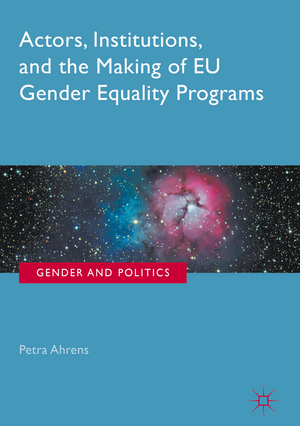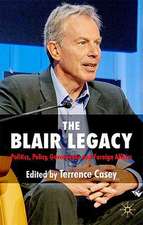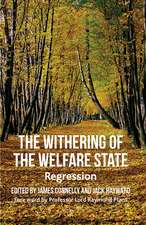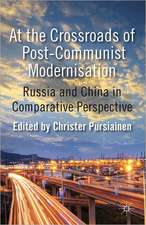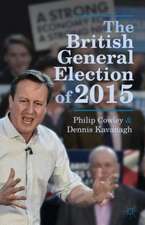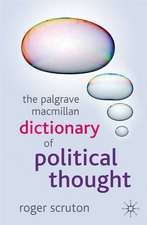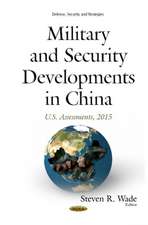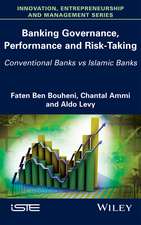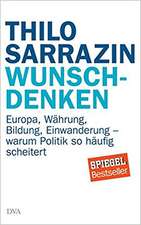Actors, Institutions, and the Making of EU Gender Equality Programs: Gender and Politics
Autor Petra Ahrensen Limba Engleză Hardback – 17 noi 2017
Din seria Gender and Politics
- 20%
 Preț: 690.22 lei
Preț: 690.22 lei - 20%
 Preț: 691.13 lei
Preț: 691.13 lei -
 Preț: 172.47 lei
Preț: 172.47 lei - 18%
 Preț: 783.09 lei
Preț: 783.09 lei -
 Preț: 389.70 lei
Preț: 389.70 lei - 18%
 Preț: 940.07 lei
Preț: 940.07 lei - 27%
 Preț: 359.33 lei
Preț: 359.33 lei - 18%
 Preț: 2101.96 lei
Preț: 2101.96 lei -
 Preț: 393.13 lei
Preț: 393.13 lei - 15%
 Preț: 526.22 lei
Preț: 526.22 lei - 15%
 Preț: 636.99 lei
Preț: 636.99 lei -
 Preț: 380.91 lei
Preț: 380.91 lei -
 Preț: 387.78 lei
Preț: 387.78 lei -
 Preț: 383.18 lei
Preț: 383.18 lei - 9%
 Preț: 254.97 lei
Preț: 254.97 lei - 15%
 Preț: 635.20 lei
Preț: 635.20 lei -
 Preț: 386.85 lei
Preț: 386.85 lei - 18%
 Preț: 1103.01 lei
Preț: 1103.01 lei -
 Preț: 380.14 lei
Preț: 380.14 lei - 22%
 Preț: 122.13 lei
Preț: 122.13 lei -
 Preț: 384.91 lei
Preț: 384.91 lei -
 Preț: 378.80 lei
Preț: 378.80 lei -
 Preț: 378.63 lei
Preț: 378.63 lei -
 Preț: 382.42 lei
Preț: 382.42 lei -
 Preț: 378.21 lei
Preț: 378.21 lei - 34%
 Preț: 1010.80 lei
Preț: 1010.80 lei - 22%
 Preț: 554.89 lei
Preț: 554.89 lei - 18%
 Preț: 724.65 lei
Preț: 724.65 lei - 18%
 Preț: 941.47 lei
Preț: 941.47 lei - 27%
 Preț: 346.59 lei
Preț: 346.59 lei -
 Preț: 415.60 lei
Preț: 415.60 lei -
 Preț: 479.58 lei
Preț: 479.58 lei - 15%
 Preț: 496.73 lei
Preț: 496.73 lei -
 Preț: 383.55 lei
Preț: 383.55 lei - 28%
 Preț: 375.36 lei
Preț: 375.36 lei
Preț: 941.62 lei
Preț vechi: 1148.31 lei
-18% Nou
Puncte Express: 1412
Preț estimativ în valută:
180.34€ • 185.80$ • 151.07£
180.34€ • 185.80$ • 151.07£
Carte tipărită la comandă
Livrare economică 24 februarie-10 martie
Preluare comenzi: 021 569.72.76
Specificații
ISBN-13: 9781137570598
ISBN-10: 1137570598
Pagini: 295
Ilustrații: XV, 305 p. 11 illus.
Dimensiuni: 148 x 210 mm
Greutate: 0.54 kg
Ediția:1st ed. 2018
Editura: Palgrave Macmillan UK
Colecția Palgrave Macmillan
Seria Gender and Politics
Locul publicării:London, United Kingdom
ISBN-10: 1137570598
Pagini: 295
Ilustrații: XV, 305 p. 11 illus.
Dimensiuni: 148 x 210 mm
Greutate: 0.54 kg
Ediția:1st ed. 2018
Editura: Palgrave Macmillan UK
Colecția Palgrave Macmillan
Seria Gender and Politics
Locul publicării:London, United Kingdom
Cuprins
Part I Introduction.- Chapter 1. EU Gender Equality Policy-Making.- Chapter 2. Theorising actors, structure and content.- Chapter 3. The history of EU gender equality policy actors.- Part II The Roadmap Adoption Process over the Course of Time.- Chapter 4. The Standard Adoption Process.- Chapter 5. Rules, routines and actors constellations over the course of time.- Part III Actors' Interpretations and (Re)Constructions of the Policy-making Process.- Chapter 6. Interpretations of the initial period.- Chapter 7. Interpretations of the drafting process.- Chapter 8. Reactions to the Adopted Roadmap.- Chapter 9. (Un)Contested Overarching Structural Features in the Policy Process.- Part IV Effects of Changing Actors' Constellations and Changing Routines.- Chapter 10. Short-term Policy Implications of the Policy Process.- Chapter 11. Long-Term Policy Implications of the Policy Process.- Chapter 12. Organizing Principles of the Policy Process.- Part V Conclusion.- Annex: Methods and Methodology.- References.- Primary Sources.- Index.
Notă biografică
Petra Ahrens is Marie-Skłodowska-Curie Fellow at the University of Antwerp, Belgium. Her research focuses on European integration, gender equality policies, public policy and transnational civil society organisations.
Textul de pe ultima copertă
This book is an actor-centred sociological study of the EU-level processes that produce gender equality policy. Based on interviews and documentary analysis, the study unpacks the process of the “Roadmap for Equality between Women and Men 2006-2010” to explain the different roles of actors in the making of EU gender equality policies. By analysing policy processes inside institutions and among institutions, the study focuses on the internal working logics in and between EU-level institutions. It highlights the shifting spaces, openings, and constraints for the development of gender equality policies. Concentrating on EU policy programmes helps shed light on the invisible aspects of EU gender equality policy-making and how this process changed regarding actors, structure and content in the late 2000s. This book will be of interest to students and scholars in the fields of EU politics, gender politics, and public policy, as well as to institutional and non-governmental actors in the area of gender politics in Europe and the working of EU politics.
Caracteristici
Covers a modern period of EU gender equality policy that has not been full addressed previously Bridges disciplines by adopting a sociological approach to a research question on EU policy-making Applies a multi-methodological approach by analyzing expert interviews, conducting a broad documentary analysis and complementing the former with qualitative network analysis
